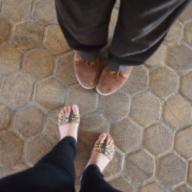幾時先用Past Prefect Tense,最好打出例子比埋我。
Thx
Past Prefect Tense
2007-10-31 3:05 am
回答 (3)
2007-10-31 3:11 am
✔ 最佳答案
perfect先岩..Past Perfect Tense (過去完成式):
Subject + had + past participle of verb (過去分詞)
過去完成式用來比較過去兩個動作的先後次序
第一件發生的事用過去完成式, 第二件發生的事用過去式. 不論句子先後次序如何, 例句:
By the time I got home, my mother had already cooked dinner.
(兩件事都係過去發生, 但例句:我回家的時候, 我媽媽已經煮好晚餐.
用past perfect 可以清楚表明較早發生的事件,而past tense用來後來發生的事.)
The thief simply walked in. Someone had forgotten to lock the door.
(有人忘記鎖門在先, 賊輕易入屋在後. 所以賊係用過去式, 而鎖門用過去完成式)
Sandy had already left when Ann got there.
(Ann 來到時, Sandy 已經走左, 所以Ann 用過去式, Sandy 用過去完成式)
要注意:
a.兩件事件必需係過去發生, 其中一件係將來式現在發生也不能用過去完成式.
b.兩件事情必需發生在過去唔同既時期. 而唔係過去同一個時段發生.
錯誤示範:
Last weekend I had gone to a party. I had met some new people. It had been interesting.
應該改成:
Last weekend I went to a party. I met some new people. It was interesting.
因為去party, 認到新朋友, 同個party 好interesting等都係同一個時期.
另外, 當你有一件事已經plan 好左將來進行, 例如你已經買好了機票明天飛, 咁樣情況下可以用present continuous tense.
be going to 同 will 比較以下, will 既可能性無咁高.
2007-10-31 3:23 am
§ Past Perfect Tense
動詞的過去完成時態的形態是:had + 動詞的過去分詞
動詞的過去完成時態表示:
過去某一時間之前已經完成的動作或狀態
使用這種時態,多會涉及兩個動作或狀態。一個在前,一個在後。
敘述前面的動作或狀態,動詞要用過去完成時態;敘述後面的動作
或狀態,動詞要用一般過去時態。
例如:
I had taken my supper when he arrived.
﹝當他到達時,我已吃完我的晚餐。﹞
※ 上述句子涉及兩個動作,一是「他到達」,二是「我吃晚餐」。
「我吃晚餐」在前,要用過去完成時態;「他到達」在後,要用
一般過去時態。
※ "I had taken my supper" 是主句, "when he arrived" 是從句
﹝副詞從句﹞。
※ 圖示:
過去 現在 將來
_________________________│__________________________
│ │
past perfect simple past
Had you finished your work when I visited you yesterday?
When I reached the station, the train had already started.
He said that his father had returned to America.
After I had done my work, I played tennis.
※ 若用了 "After" 這個詞,可不用過去完成時態,因已有「之後」
的含意。即:
After I did my work, I played tennis.
在這種情況下,"After I did my work"是:
" Simple past Tense in form, but past perfect Tense in meaning."
﹝形式上是一般過去時態,但意義上是過去完成時態﹞
同樣,I had seen your father before I went.亦可寫成:
I saw your father before I went.
用英文表示「我看電視之前已完成功課」,可以有多種方式:
1. When I had finished my homework, I watched television.
2. I had finished my homework when I watched television.
3. I had finished my homework before I watched television.
4. I finished my homework before I watched television.
5. After I had finished my homework, I watched television.
6. After I finished my homework, I watched television.
7. I finished my homework and I watched television.
﹝時間順序法﹞
※ 「時間順序法」:按事件的先後次序連接起來。
如果涉及三件或以上的事件,就更需要用這種方法了。例如:
I reached the station, the bell rang and the train started.
練習
翻譯
1. 昨晚當那個賊偷我的東西時,我已睡了三小時。
2. 當他回來時,他的父親已死了是不真確的。
3. 他昨天知道我已尋回我於上星期失去的手錶。
4. 他說他的父親昨天己歸家了。
5. 我不相信學校已開課。
6. 在你認識他之前,他已成為著名的科學家了。
7. 我到來之前,曾見過你的母親。
8. 我記得你在上海已住了三年。
9. 昨天當我在廚房時,你是否已完成你的功課?
10. 我在他離開之後到達。
Answer:
【供參考】
1. I had slept for three hours when the theif stole my things last night.
2. That his father had died when he returned was not true.
3. He knew yesterday that I had found the watch which lost last week.
4. He said that his father had come home yesterday.
5. I did not believe that the school had opened.
6. He had become a famous scientist before you knew him.
7. I had seen your mother before I arrived.
8. I remembered that you had lived in Shanghai for three years.
9. Had you finished your homework when I was in kitchen yesterday?
10. I arrived after he had left.
動詞的過去完成時態的形態是:had + 動詞的過去分詞
動詞的過去完成時態表示:
過去某一時間之前已經完成的動作或狀態
使用這種時態,多會涉及兩個動作或狀態。一個在前,一個在後。
敘述前面的動作或狀態,動詞要用過去完成時態;敘述後面的動作
或狀態,動詞要用一般過去時態。
例如:
I had taken my supper when he arrived.
﹝當他到達時,我已吃完我的晚餐。﹞
※ 上述句子涉及兩個動作,一是「他到達」,二是「我吃晚餐」。
「我吃晚餐」在前,要用過去完成時態;「他到達」在後,要用
一般過去時態。
※ "I had taken my supper" 是主句, "when he arrived" 是從句
﹝副詞從句﹞。
※ 圖示:
過去 現在 將來
_________________________│__________________________
│ │
past perfect simple past
Had you finished your work when I visited you yesterday?
When I reached the station, the train had already started.
He said that his father had returned to America.
After I had done my work, I played tennis.
※ 若用了 "After" 這個詞,可不用過去完成時態,因已有「之後」
的含意。即:
After I did my work, I played tennis.
在這種情況下,"After I did my work"是:
" Simple past Tense in form, but past perfect Tense in meaning."
﹝形式上是一般過去時態,但意義上是過去完成時態﹞
同樣,I had seen your father before I went.亦可寫成:
I saw your father before I went.
用英文表示「我看電視之前已完成功課」,可以有多種方式:
1. When I had finished my homework, I watched television.
2. I had finished my homework when I watched television.
3. I had finished my homework before I watched television.
4. I finished my homework before I watched television.
5. After I had finished my homework, I watched television.
6. After I finished my homework, I watched television.
7. I finished my homework and I watched television.
﹝時間順序法﹞
※ 「時間順序法」:按事件的先後次序連接起來。
如果涉及三件或以上的事件,就更需要用這種方法了。例如:
I reached the station, the bell rang and the train started.
練習
翻譯
1. 昨晚當那個賊偷我的東西時,我已睡了三小時。
2. 當他回來時,他的父親已死了是不真確的。
3. 他昨天知道我已尋回我於上星期失去的手錶。
4. 他說他的父親昨天己歸家了。
5. 我不相信學校已開課。
6. 在你認識他之前,他已成為著名的科學家了。
7. 我到來之前,曾見過你的母親。
8. 我記得你在上海已住了三年。
9. 昨天當我在廚房時,你是否已完成你的功課?
10. 我在他離開之後到達。
Answer:
【供參考】
1. I had slept for three hours when the theif stole my things last night.
2. That his father had died when he returned was not true.
3. He knew yesterday that I had found the watch which lost last week.
4. He said that his father had come home yesterday.
5. I did not believe that the school had opened.
6. He had become a famous scientist before you knew him.
7. I had seen your mother before I arrived.
8. I remembered that you had lived in Shanghai for three years.
9. Had you finished your homework when I was in kitchen yesterday?
10. I arrived after he had left.
2007-10-31 3:13 am
如果要敘述過去兩個動作/兩件事,兩者一先一後發生,先發生的便要用Past Prefect Tense,後者用Simple Past Tense.
例:I had turned off the TV before I went to bed last night.
例:I had turned off the TV before I went to bed last night.
收錄日期: 2021-04-13 14:15:48
原文連結 [永久失效]:
https://hk.answers.yahoo.com/question/index?qid=20071030000051KK02946


